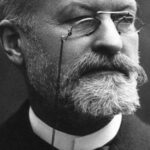Aaron Ciechanover is an Israeli biochemist. He was awarded the Nobel Prize in Chemistry in 2004.
Life and Career
Aaron Ciechanover was born on 1 October 1947 (age 75 years), in Haifa, Israel. He pursued his undergraduate studies in medicine at the Hebrew University of Jerusalem, where he received his M.D. degree in 1974.
Ciechanover later earned a Doctor of Medicine (D.Sc.) degree in biochemistry from the Technion–Israel Institute of Technology in 1981.
In the 1980s, Aaron Ciechanover, along with his colleague Avram Hershko, began their pioneering work on the ubiquitin-proteasome pathway, a critical mechanism for protein degradation within cells. Their research led to the discovery of how cells mark unwanted proteins with a small protein called ubiquitin, targeting them for degradation by the proteasome. This groundbreaking work had profound implications for our understanding of cell regulation and has far-reaching implications in various fields, including cancer research and neurodegenerative diseases.
Ciechanover continued his research and made significant contributions to the understanding of the ubiquitin-proteasome system and its role in cellular processes.
He has held various academic positions, including professorships at the Technion and other prestigious institutions.
Aaron Ciechanover’s work has had a profound impact on the fields of biochemistry, cell biology, and medicine, paving the way for the development of targeted therapies for various diseases.
Award and Legacy
Aaron Ciechanover has received numerous awards and honors throughout his career, with the most notable being the Nobel Prize in Chemistry in 2004. This prestigious award recognized his groundbreaking research on the ubiquitin-proteasome pathway, which revolutionized our understanding of cellular protein degradation. The Nobel Prize was jointly awarded to him, Avram Hershko, and Irwin Rose for their collaborative work in elucidating this fundamental cellular process.
He was also awarded the Israel Prize in Biochemistry (2000), One of the highest honors in Israel, this award recognized his outstanding contributions to the field of biochemistry.
Aaron Ciechanover’s work on the ubiquitin-proteasome pathway has left a lasting legacy in the fields of biochemistry, cell biology, and medicine: His research has deepened our understanding of how cells regulate protein levels and maintain their health. This knowledge has far-reaching implications for various areas of biology, including cancer research, neurodegenerative diseases, and immunology.
The insights gained from Ciechanover’s work have paved the way for the development of targeted therapies that manipulate the ubiquitin-proteasome pathway. Drugs that modulate this system have been used in the treatment of certain cancers and are being explored for other diseases.
Tags: 1 October 1947, Aaron Ciechanover, Aaron Ciechanover 's Birthday, Aaron Ciechanover Birthday, Aaron Ciechanover Death anniversary, aaron ciechanover nobel prize, Aaron Ciechanover Observer Voice, aaron Ciechanover technion, Award for Aaron Ciechanover, Career of Aaron Ciechanover, FAQ on Aaron Ciechanover Aaron Ciechanover, Legacy of Aaron Ciechanover, Life of Aaron Ciechanover, Nobel Prize Laureate, Observer Voice Aaron Ciechanover, prof aaron ciechanover, Tribute to Aaron Ciechanover











